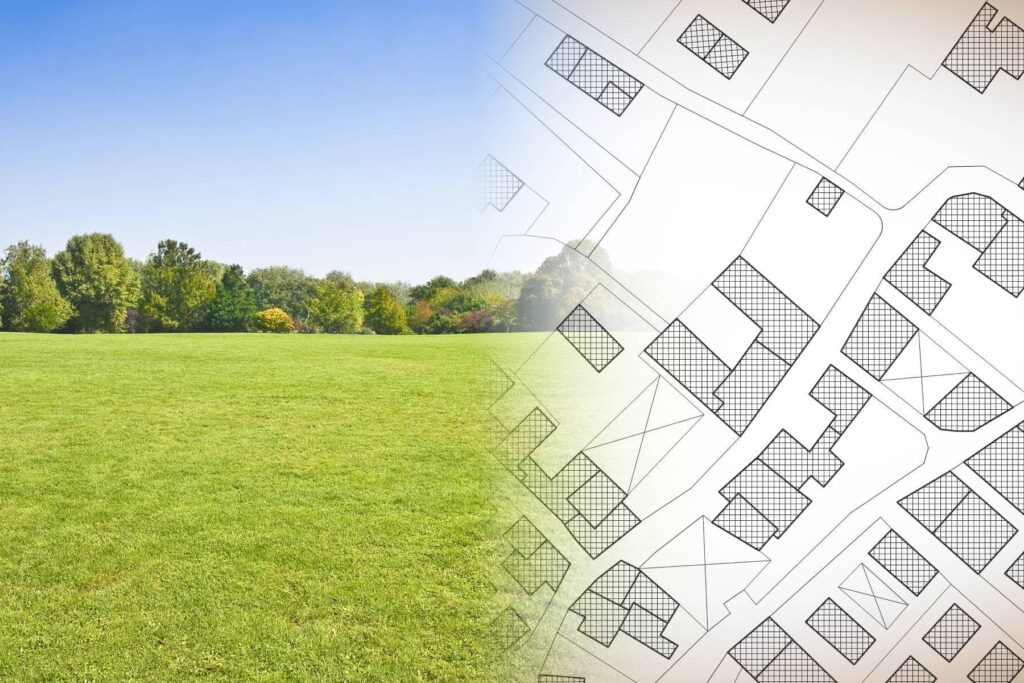With property prices continuing to rise, even throughout the Covid-19 pandemic, many buyers and investors have switched their thinking to outside of the box.
And that means more and more are looking to purchase land for development.
If you haven’t considered developing land before now, it probably seems like a daunting prospect compared with purchasing property.
But we’ve outlined everything you need to know right here…
What does land development mean?
Land development is a broad subject and can refer to any form of ‘change’ to the landscape.
In the case of property, land development refers to the construction or modification of buildings on a plot.
How to start developing land?
Although it can seem daunting, buying land is often not as complicated as buying existing property.
But getting the right advice in the key areas of planning, investment, legal and finance is vital, so a good planning consultant, land agent, experienced solicitor and financial advisor will become your best friends!
In order to start developing land, the first thing you’ll need, though, is a plan of action.
Before you even start looking at land to purchase, you should:
• Establish your budget and costs
• Know your intentions – will you live in what you build, sell it and move on, or will you simply keep the land and sell in the future?
• Explore and research the location you want to buy in
Once you’re clear on your aims, your budget and your location, you can start looking for plots that are up for sale.
How to buy land for development
There are two distinct types of land you could look to buy and both have advantages and disadvantages to doing so.
Greenfield land is a site that has never been built on before and these plots tend to be in natural environments like the countryside.
While greenfield sites might be ‘purer’ and in more attractive locations, gaining planning permission to build on them can be difficult.
Brownfield sites, meanwhile, are often derelict or disused plots that have been developed in the past.
These sites often require more money to clear and are in less attractive areas but gaining planning permission to build on them is often much easier.
Where to find land for sale
A great place to start when looking for suitable plots is actually the online property portals like Rightmove, Zoopla and OnTheMarket.
However, much of the land for sale online could have existing structures already in place, so if you’re keen to avoid the costs associated with removing those, you’ll be better off speaking directly to estate agents, land agents and land brokers, and exploring land auctions.
How to assess your plot
Buyers of property should always have a survey done before committing to a purchase – and it should be no different for land buyers.
A land surveyor will be able to assess the land you’re interested in buying and point out any potential problems, such as:
• Risk of flooding
• Pollution or contamination
• Protected trees
• Site access and boundary issues
The land development application process
Building up a good relationship with town planners is key if you’re looking to develop land in their jurisdiction.
Many plots of land are sold with outline planning permission attached – but this only suggests what might be permittable, not what can definitely be done.
You’ll need to work with the planning department to get a steer on what you may be able to do with the land you’re interested in.
You should also speak to your solicitor and find out if the land you’re looking at has any restrictive covenants attached to it that could scupper your plans – even if you do obtain full planning permission.
The land purchase process
The actual process you’ll go through when you’re ready to buy a piece of land will vary depending on who, or where, you’re buying it from.
Some sales will require sealed bids, while others will see you negotiate through an agent or submit a bid at auction.
Whatever the process, the most important thing is that you do your research and are certain the plot works for you.
Legal work, funding, exchange and completion
Once you’ve agreed a deal with the seller of the land, you’ll go through a legal process with your solicitor.
If you’re purchasing the land with additional funding, such as mortgage, this is the time to finalise that.
After all checks are complete and your funding is ready, you’ll exchange contracts and complete on your purchase.
Tax on development land
When buying or selling any form of land, there are tax considerations you’ll need to be aware of.
Stamp duty on land
Stamp duty is also due on land purchases as well as property – so if you buy a piece of land to develop, you may have to pay it
Capital gains tax
If you buy a piece of land and then sell it for a profit, you may be liable for capital gains tax.
This also applies if you buy a piece of land, build a property and then sell it, although tax in this area can be complicated so you should always seek professional advice.
Developing or selling land you already own
One way to boost your coffers, perhaps if you’re looking to create a pension pot or take a bigger step on the property ladder, is to sell or develop land you already own.
Many homeowners, particularly those with large garden plots, consider selling the land to developers or building a property on the land themselves to either live in, or sell on.
Things to consider when developing land you already own
• If you sell the land to a developer, for instance your garden, you may need to pay capital gains tax on any profit you make
• If you sell the land with outline planning permission, you may be able to achieve a higher price and retain a level of control over what is built by the person you sell to
• If you want to build on the land yourself, either constructing a property to live in or building something to sell, you’ll need planning permission
• If you sell your land to a developer, consider how having a new property close to your existing home could affect its value







